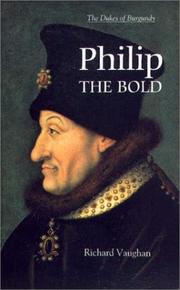Check nearby libraries
Buy this book

This book is a biography of Philip and a study of the emergence of the Burgundian state under his aegis in the years 1384-1404, paying particular attention to his crucial aquisition of Flanders. There is comprehensive analysis of how Philip's government worked. When in 1363 the duke of Burgundy died without an heir, the duchy returned to the French crown. John II's decision to give it to his fourth son, Philip, had some logic behind it, given the independence of the inhabitants; but in so doing he created the basis for a power which was to threaten France's own existence in the following century, and which was to become one of the most influential and glittering courts of Europe. Much of this was due to the character of Philip the Bold; by marrying the daughter of the count of Flanders, he inherited the wealth of the great Flemish towns in 1384, and the union of the two great fiefdoms to the north and east of France under one ruler meant that the resources of the duke of Burgundy were as great as those of the kingdom itself. From 1392 onwards, he was at loggerheads with the regent of France, his brother Louis, duke of Orleans, and this schism was to prove fatal to the kingdom, weakening the administration and leading to the French defeat by Henry V in 1415. Richard Vaughan describes the process by which Philip fashioned this new power, in particular his administrative techniques; but he also gives due weight to the splendours of the new court, in the sphere of the arts, and records the history of its one disastrous failure, the crusade of Nicopolis in 1396. He also offers a portrait of Philip himself, energetic, ambitious and shrewd, the driving force behind the new duchy and its rapid rise to an influential place among the courts of Europe. - Publisher.
The theme of Richard Vaughn's first volume in his masterly four-part history of the Valois dukes of Burgundy is uncompromisingly political and institutional. It is "the emergence of a Burgundian state under Philip the Bold's aegis in the years 1384 to 1404". The book is, after all, subtitled "The Formation of the Burgundian State". Vaughan did not set out to write a biography of Philip the Bold: his overall aim was "to describe his policies, his administration, his court and his finances, and to depict Burgundy as a European power". He was aware of the potentially controversial nature of his interpretation in 1962, and it remains controversial today. Received opinion had tended to link the formation of a Burgundian "state" with the reign of Philip's grandson, Philip the Good (1419-67), which witnessed the unification of the Low Countries under Burgundian rule. From this perspective, Philip the Bold was viewed more as an ambitious French prince then as the creator of a new polity on the European political stage. The central issue addressed by Vaughan's book was whether Philip the Bold was the founder of a "new", independent state; or was he simply a great prince ("first peer") of France, seeking to expand his resources and territories at the expense of the French crown, attaining a hegemonic role in French politics by exploiting all the means at his command? If so, he was essentially similar to other French princes of the blood -- the dukes of Orleans, Berry or Bourbon -- all of whom were inextricably enmeshed in French power-politics, manipulating the networks of patronage and clientage which had formed in and around the Parisian court. Vaughan's emphasis, in 1962, on the centralization and coordination of power and institutions under Philip the Bold can now be offset by an increased awareness of alternative models for the "modern" state. - Malcolm Vale.
Check nearby libraries
Buy this book

| Edition | Availability |
|---|---|
|
1
Philip the Bold: the formation of the Burgundian state
2002, The Boydell Press
in English
- New ed.
085115915X 9780851159157
|
aaaa
Libraries near you:
WorldCat
|
|
2
Philip the bold: the formation of the Burgundian state
1979, Longman
in English
- [Rev. ed.].
0582490480 9780582490482
|
zzzz
Libraries near you:
WorldCat
|
|
3
Philip the Bold: the formation of the Burgundian state
1962, Harvard University Press
Hardcover
in English
|
zzzz
Libraries near you:
WorldCat
|
| 4 |
zzzz
|
| 5 |
zzzz
Libraries near you:
WorldCat
|
Book Details
Edition Notes
Includes bibliographical references (p. 241-262) and index.
Classifications
The Physical Object
ID Numbers
Community Reviews (0)
Feedback?| July 31, 2020 | Edited by ImportBot | import existing book |
| September 21, 2018 | Edited by Bryan Tyson | Edited without comment. |
| April 28, 2010 | Edited by Open Library Bot | Linked existing covers to the work. |
| February 14, 2010 | Edited by WorkBot | add more information to works |
| December 10, 2009 | Created by WorkBot | add works page |









